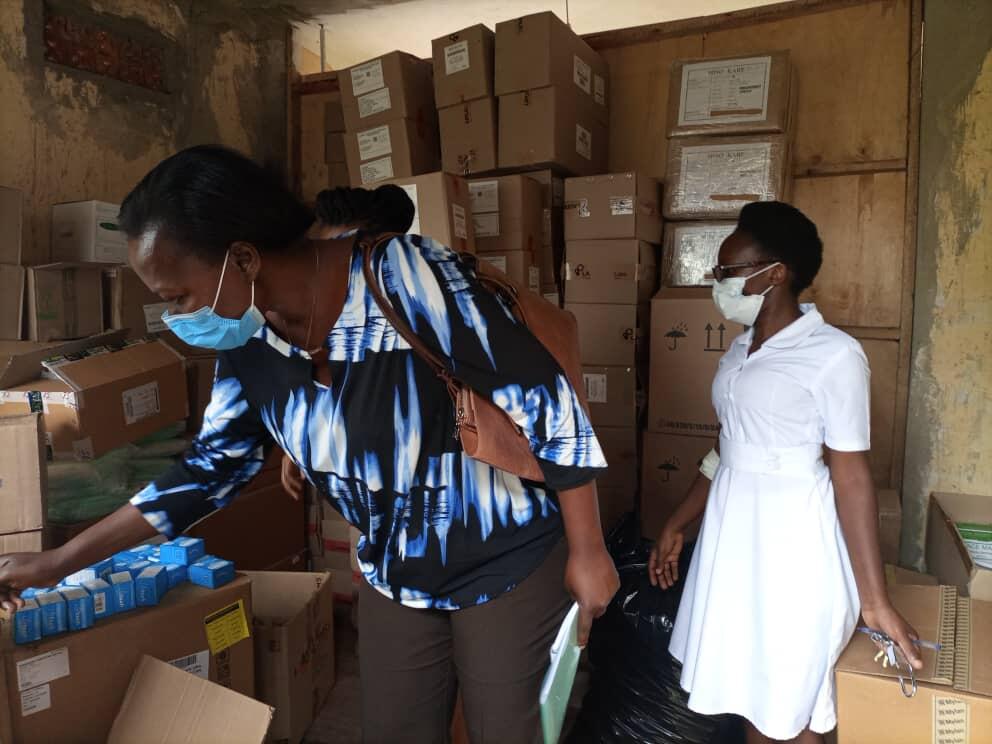The delivery of an effective Sexual Reproductive Health and Rights (SRHR) programme depends on the availability of health commodities for the end-user.
“Bringing health commodities to the point of service delivery and making sure they reach the last mile are critical links in the logistics systems that support product availability,” said Mr. Alain Sibenaler, the UNFPA Uganda Representative.
Thus, between April 19-27 2021, UNFPA Uganda in collaboration with the Ministry of Health (MoH), implementing partners, and national warehouses conducted its first spot-check under the Last Mile Assurance (LMA) process. Spot-checks are undertaken periodically to provide reliable evidence on whether UNFPA-donated programme supplies were adequately managed and safeguarded by implementing partners, and effectively and timely reached the designated service delivery points (SDPs) where beneficiaries can access them (the "last mile"). They also provide the opportunity for UNFPA and its implementing partners to identify bottlenecks at an early stage and coordinate mitigation actions that best support shared objectives.
The main objectives of the spot-checks in Uganda were to: provide reliable evidence on whether UNFPA-donated programme supplies were adequately managed and safeguarded and effectively and timely reached the designated service delivery points (SDPs) where beneficiaries can access them; to provide an opportunity for UNFPA and its implementing partners to identify issues at an early stage and coordinate mitigation actions that best support shared objectives; and to build the capacity of Ministry of Health, UNFPA Uganda country office and implementing partners in the conduct of spot-checks and inventory audits.
The spot-check examined seven reproductive health commodities: Implanon, Jadelle, Male Condoms, Depo Provera, Sayana Press, Female Condoms, and Oxytocin delivered to Ministry of Health and managed by Joint Medical Stores during the period of 01 January 2019 – 31 December 2020.
Two national warehouses (Joint Medical Stores and National Medical Stores) and 31 health facilities across seven districts; Kampala, Luwero, Mityana, Mpigi, Mukono, Nakaseke, and Wakiso were assessed. The activity also evaluated the role of four implementing partners in reproductive health commodity supply chain including Marie Stopes Uganda, Population Services International-Uganda Reproductive Health Uganda, Uganda Health Marketing Group, and USAID RHITES.
The spot-check included inspection the implementing partners inventory records; performance and reconciliation stock-counts; assessment of the condition of the goods; assessment the adequacy of inventory levels maintained (i.e. stock-outs, stocks below mandated minimum levels, potential excess stocks); quantify adjustments due to waste and losses; tracing samples of deliveries to ensure that they were received in the right quantities and condition; trace samples of distributions by the implementing partners to ensure the products reached the intended facilities in the right quantities and conditions; and assessing the level of implementation of key internal control requirements for the management and safeguarding of the supplies.
UNFPA Uganda Programme Analyst (Family Planning) Ms. Roselline Achola said that working with a third party - Earnest & Young - was to enable the transfer of knowledge to the Uganda country office colleagues, who will then continue to do the spot-check exercises in the subsequent quarters.
“The on-the-job training provided by Ernest & Young will allow the country office staff to undertake future spot-checks with limited or no involvement of external resources. Furthermore, this inventory spot-checks provide an opportunity for UNFPA and its implementing partners to identify issues in timely manner and coordinate mitigation actions that best support shared objectives,” Ms. Achola said.
One leader of the consortium of private service delivery points in Mukono district said the exercise was a learning experience which will boost their knowledge and skills.
“For instance, we did not know that the commodities we receive from Joint Medical stores require maintaining stock cards. Now that I have been taken through the basics, it is a learning point for us and I will ensure that every member of this consortium has a well maintained stock card for accountability,” he said.
Background:
Uganda is one of the countries that benefit from the UNFPA supplies programme and each year UNFPA contributes over a third (4 - 8 million USD worth of Reproductive Health Commodities) of the overall national reproductive health commodity budget. These supplies are managed by the Ministry of Health which provides oversight to ensure proper warehousing, distribution, and utilization by the intended population.
Uganda has over 6,404 health facilities, of which 3,084 (48 percent) are public, 2,373 (37 percent) are private for-profit (PFPs), and 947 (15 percent) are private not-for-profit and these receive their reproductive health pharmaceutical supplies from majorly two national warehouses - the National Medical Stores that supplies commodities to public health facilities, and the Joint Medical Stores that supplies to private –not- for- profit health facilities through the alternative distribution mechanism.
Written by Roselline Achola and Timothy Kasule



